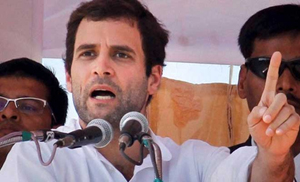 Bhopal, Oct 18: Congress vice-president Rahul Gandhi told an emotional tale involving his mother Sonia to strike a chord with people at a poll rally in the tribal-dominated Shahdol in Madhya Pradesh Thursday.
Bhopal, Oct 18: Congress vice-president Rahul Gandhi told an emotional tale involving his mother Sonia to strike a chord with people at a poll rally in the tribal-dominated Shahdol in Madhya Pradesh Thursday.
He said there was nothing more important for him than ensuring respect to women and went on to suggest that women were not being respected in the state.
"Izzat kya hoti hai ye meri ma ki kahani se samjho," Rahul said, and recalled how Sonia was in tears after she could not cast her vote during the crucial debate on Food Security Bill in Parliament.
"I knew my mother was not well and was looking at her every five-ten minutes. When she left with (Union Minister) Shailajaji, I thought it was an awkward time to leave. I was scared and followed her. She refused to see the doctor and said do whatever you want, I will not leave before pressing the button because I have been fighting for the Bill for years. I was getting angry because she did not yield despite being ill. While being taken to hospital she was not able to breathe... she was in tears. This is izzat, not rajniti," he said, as he told an "andar ki baat".
Insisting that he wants to start a new kind of politics, the Congress vice-president ranked respect above development. "Whoever becomes the chief minister, I guarantee the tribal, tribal women, poor and the youth will get respect in Madhya Pradesh. If someone does not show respect, we will see," he said.
Quoting a Unicef report, he claimed hunger in Madhya Pradesh was on a par with hunger in Africa. "They don't understand that one can't talk of development when the stomach is empty."
Rahul accused the BJP of trying to stall the passage of the "historic" Food Security Bill in Parliament.
"For the first time, no one — dalits, tribals, members of any caste or religion — will sleep hungry in the country," he said, adding, "We understand your hunger, your struggle.''
Rahul alleged that MP had come to a standstill and promised the Congress will bring young people to the forefront and respect the poor by ensuring food to them.
He said the representation of tribals in Parliament and Assemblies was inadequate. "Unless this is changed, your voice will not reach there."





Comments
Add new comment